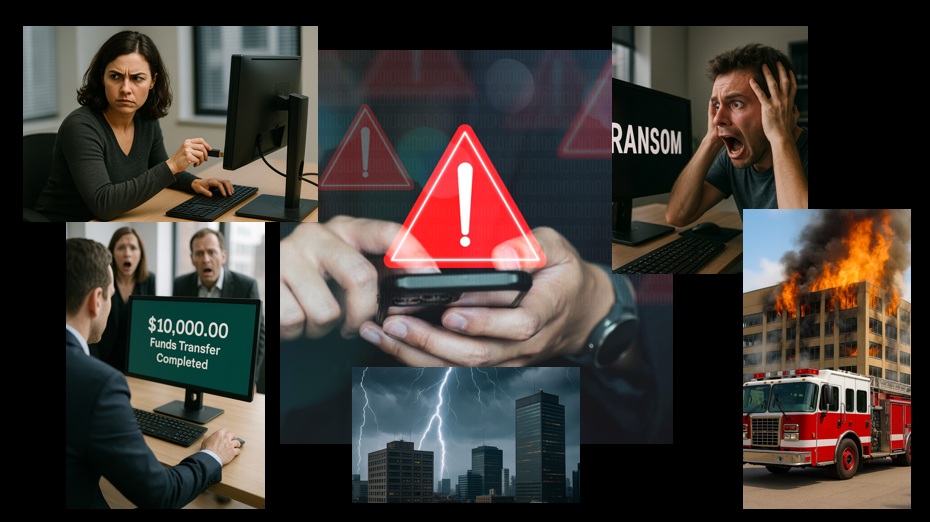INDUSTRY LUMINARY Paul Dippell likens the massive effort by MSPs to help their clients at the start of lockdown last year to the Berlin Airlift during the early days of the Cold War. While MSPs weren’t flying in food, water, and medicine to a West Berlin under siege, they were providing a lifeline to SMBs.
“”They just worked 24 hours a day, seven days a week to get their clients in the cloud so they can work from home. And it really was a worldwide phenomenon,”” says Dippell, CEO of Service Leadership, publisher of widely respected benchmark the Service Leadership Index and now part of ConnectWise.

Paul Dippell
Then they hit the hard, cold reality of keeping themselves in business through an economic downturn that still lingers. For an industry that accomplished a V-shaped recovery, it’s worth examining the short-term maneuvers, long-term business model decisions, and cultural attributes that separated channel pros who struggled from those who are thriving in the “”new normal.””
Short-Term Maneuvers
The initial work-from-home rush created a spike in project work and a smaller uptick in revenue through April, according to Don Baham, president of Kraft Technology Group, an IT solution provider in Nashville, and a branch of the KraftCPAs family of companies. “”Then, to be honest,”” he says, “”it really went off a cliff for a couple months.””
“”Pretty much everybody had a terrible Q2,”” confirms Dippell, who adds that the average MSP in Q1 2020 had reached a revenue height of 15% above Q1 19, “”which was the highest our entire population around the world has ever reached, which is great. Then COVID hit.”” The average MSP had 0% profit growth in Q2, and revenue contracted swiftly too, he says. However, both revenue and profit were on the rise again in Q3 and Q4. “”That’s a V-shaped recovery.””
Baham saw a similar trajectory. “”Summertime moving towards the end of the year, people started coming back to conversations that we were having that first part of 2020 or in 2019,”” and put projects back on the roadmap. In addition, Kraft Technology Group signed some new customers during that time. In the end, 2020 marked the best revenue performance—a 45% increase—that the MSP has had in several years.
Dippell says the MSPs who cut expenses as deeply and as quickly as possible, and then leaned into sales and marketing, were able to “”catch the first breath of a revenue rebound,”” which brings profit back.
Indeed, when COVID hit, the first thing Anthony Oren, CEO of Nero Consulting, an MSP in New York, did “”was double down on my sales and marketing efforts.”” While his firm did take a revenue hit from its hospitality clients, Oren says that 2020 was Nero Consulting’s best year in terms of sales.

Anthony Oren
In general, Dippell says, MSPs at a higher Operational Maturity Level (OML), the Service Leadership benchmark that measures a variety of attributes, did better than less mature peers. Among other things, they “”have better information about what’s going on in their own company … from a profit and loss and revenue and expense standpoint,”” he explains.
Shawn Walsh, a former MSP and CEO of Encore Strategic Consulting, a coaching and sales development firm in Bedford, N.H., agrees with Dippell. “”Many of the MSPs I work with have actually seen double digit growth [in 2020], both in top-line revenue and bottom-line profits,”” he says, adding that “”those numbers had more to do with their maturity as a business.””
For example, notes Dippell, while many MSPs made financial accommodations for their struggling customers, those who are more operationally mature did so judiciously by determining which ones needed some short-term leeway to stay in business. Less operationally mature MSPs were not as selective, which led to their own struggles to stay in business. “”They all have a heart of gold, but you have to … temper that heart of gold with some cold, steely-eyed rationality,”” Dippell says.
Long-term Business Model Decisions
Many MSPs also benefitted from business decisions made long before the pandemic. One, according to Walsh, was already having the technology in place to enable remote work. Some MSPs, he notes, had already been laying the groundwork for the ability to shift to remote in a disaster. “”You really saw the difference between the MSPs who had really thought that out and truly had a strategy for their clients to go remote”” and everyone else, Walsh says. Customers of the prepared MSPs never “”[saw] a blip in service.””

Shawn Walsh
Iconic IT, an MSP headquartered in Dallas, is an example. “”We’ve been building a foundation in the cloud now for five to eight years, and when we had to flip the switch, wow, it went really well,”” says CEO Mike Fowler. “”We were way more prepared to send 50% or more of our clients to work from home and keep them productive by simply connecting them through a VPN,”” and utilizing the security protocols the company had put in place.
The move to cloud and a managed services model proved fortuitous revenue-wise, too. Dippell notes that while hardware and software sales were dropping in Q2, cloud and managed services revenue was rising and continued rising throughout 2020.
Oren says managed services comprised the bulk (80%) of his firm’s revenue in 2020. “”The last project we had would have probably ended in February 2020,”” he says.
For Baham, too, the managed services model played a key factor in weathering the storm. “”I definitely believe that had we not had the monthly recurring revenue base that we have, 2020 would have been a lot different from a revenue perspective. We would have certainly suffered quite a bit more.”” Going forward, he expects to maintain a healthy balance of 60% MRR/40% project work.
Cultural Attributes
In addition to navigating economic ups and downs, MSPs had to learn how to manage employees working from home. A good company culture distinguished those who did well, Walsh says. “”Their staff has good leadership skills and can go home and work remotely without direct supervision. … You’ve got to have a culture of trust where you’re not micromanaging your people.””
Baham acknowledges that culture is extremely important—and also difficult to sustain when employees are apart. His firm had been using Crewhu, an employee recognition platform, before the pandemic. One issue the firm encountered was that sometimes technicians weren’t passing on work, and tickets “”were getting a little bit stale.”” He believes technicians may have been worried about their utilization goals and were holding onto work, so his director of operations created a new “”badge”” in Crewhu that recognized employees for passing work to their colleagues.
Some Temporary Changes May Be Permanent
Channel pros also had to implement changes to communicate with existing customers as well as continue generating new business.
Videoconferencing systems like Zoom and Microsoft Teams, of course, have been the go-to for most. Oren says he likes the more personal aspect of video sales calls and customer meetings with both parties at home. In addition, he finds there are fewer gatekeepers. “”If a company needed help, let’s say remote desktop or to button up their security, that came straight from the top. And so the virtual meeting was usually [with] a decision maker [and] if they were happy with what they heard … it was almost a done deal after the first call.””
Walsh believes video sales calls and some amount of customer meetings are here to stay as everyone has gotten comfortable with the format and both decision makers and salespeople have found it saves time.

Don Baham
Baham sees that for the future of on-site work too. “”We’ve gotten very creative with what we can do remotely,”” he says, which includes security assessments that previously would’ve required an on-site technician. “”It keeps the technician in the office to do work on other things, and saves the client money as well,”” he says.
He does worry that lack of face-to-face contact over the long term will make relationships less sticky. “”I think we’ve got to balance that when things start turning around,”” he says. “”We may choose to continue to do some things remotely, but go back to doing in-person for some things or at some frequency.””
The service desk is also impacted by not being physically together to help each other out, Baham says. “”We’ve had some challenges with some client support issues and productivity and working through tickets and time to resolution.””
Walsh says some MSPs are addressing this with open Zoom or Teams meetings, something Baham has been considering. “”With everybody logged in … it’s kind of a reminder that we’re still working together,”” Walsh says. “”And then you can unmute yourself and say, ‘Hey, I’m stuck on this. Anybody got an answer for this?’ So you still get that casual exchange of information.””
Working remotely also brought security even more to the fore for many MSPs, notes Oren, as they now faced the same concerns as their customers. “”We spent a good portion of probably Q2 and Q3 of 2020 kind of rebuilding our defenses and in building up new ones,”” he says.
As a result, Oren’s focus has permanently changed. “”Our culture almost shifted from ‘we’re an MSP and we do security’ to now ‘we’re a cybersecurity company and we happen to do IT services.'””
The Future
Despite all the turbulence, or maybe because of it, MSPs are needed now more than ever, Dippell says. “”I think we are headed into a phase where there will be more remote, more mobile work, and remote means more cloud. But more cloud doesn’t mean less MSP or less IT budget. It generally means more.”” Further, he adds, as SMBs digitize more of their operations and client interactions, more of them are going to turn to MSPs for help.
In turn, he says, MSPs will have to meet the escalated need for cybersecurity as well as be “”capable of handling more and more complex technology and business relationships.””

Mike Fowler
Oren agrees. The new normal MSP, he believes, should be a hybrid mix of managed service security provider and technology broker, connecting customers with the solutions they need versus supplying them directly.
The new normal MSP will also have more diverse tools in the toolbox, Walsh says, “”to offer clients cloud versus on-prem versus SaaS.””
Certainly MSPs have learned some important things that will carry forward, reflects Fowler. “”We did learn that we can work from anywhere and still be productive for our clients. We learned that people who tend to be productive in the office for us were also productive working at home. And those that struggled, struggled at home.””
With that knowledge, he believes, MSPs will look to widen their talent pool by hiring in different geographic areas where the cost for employees is lower. “”I think that’s going to help. We’re going to be able to pull in talent and trust that the job will get done with people never even having to travel to the office or to the client’s site.””
If anything about the future is certain, Fowler concludes, it’s that nothing about where and how people work is going backwards. “”We’re only going to keep going forward. And that will be a new normal for all of us. I think it already feels normal.””
Image: iStock














